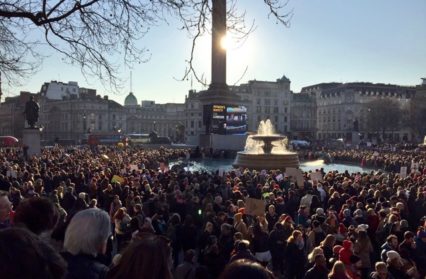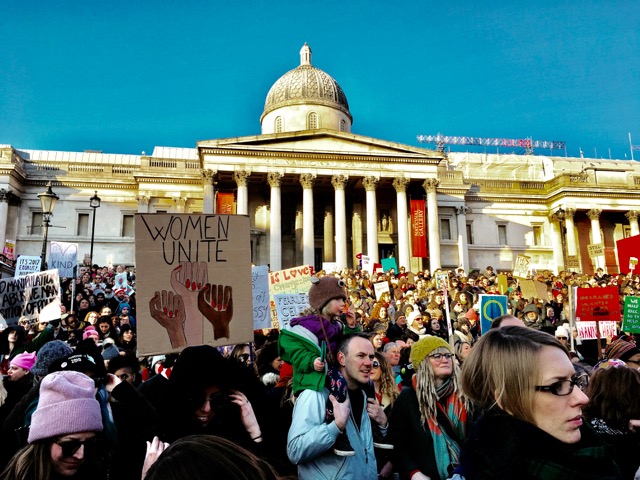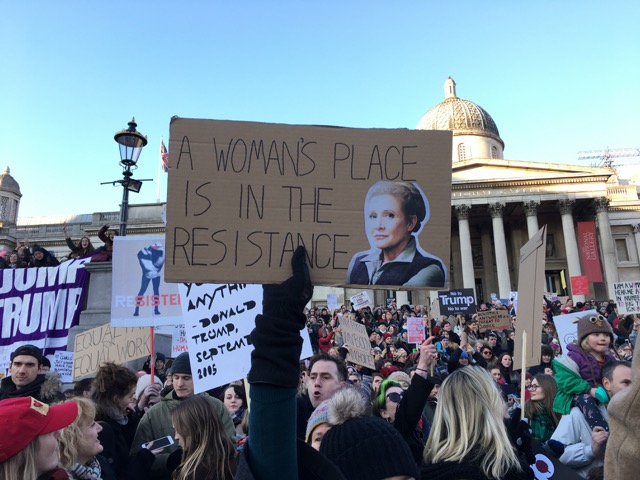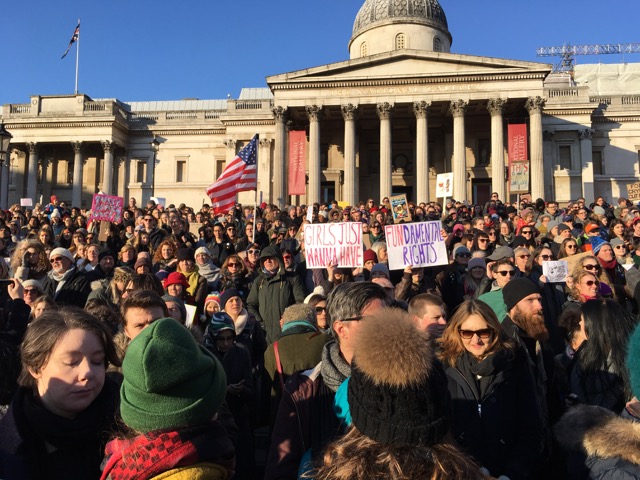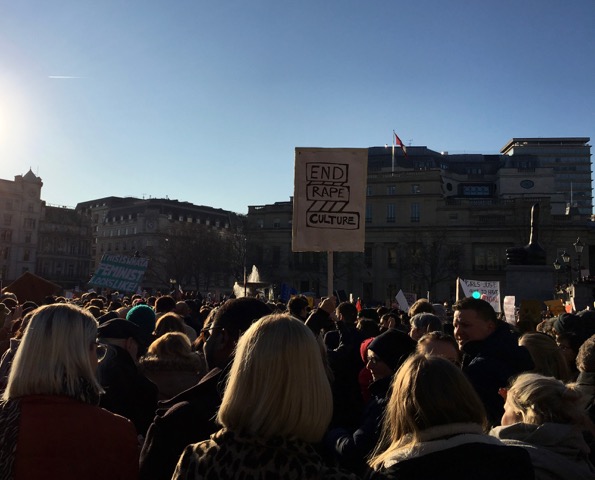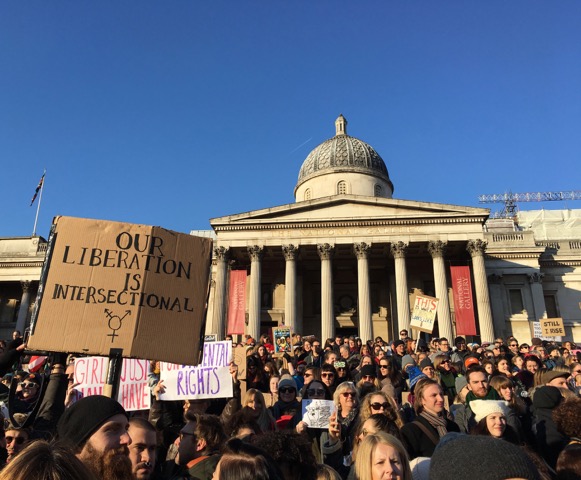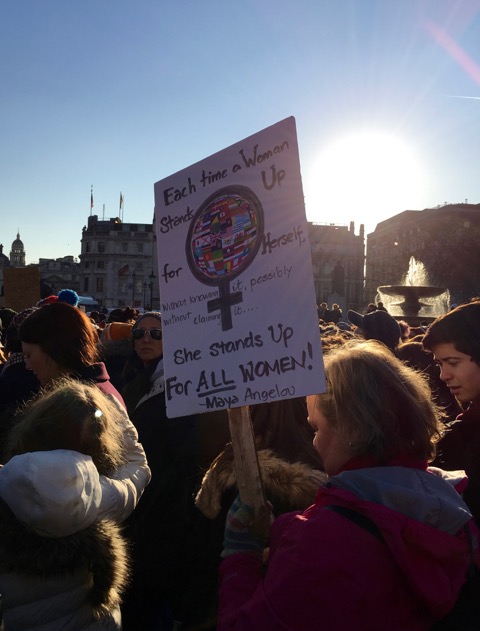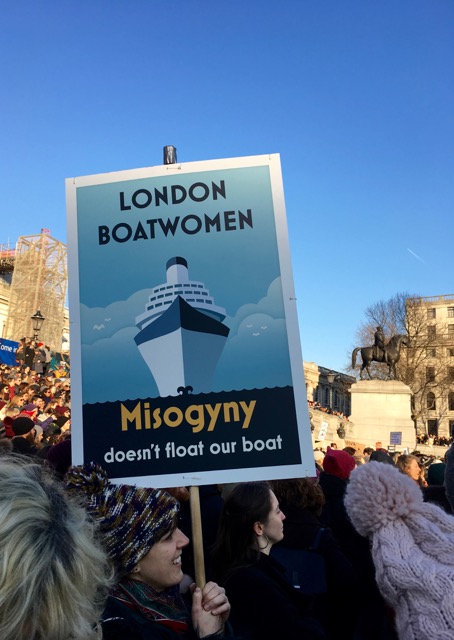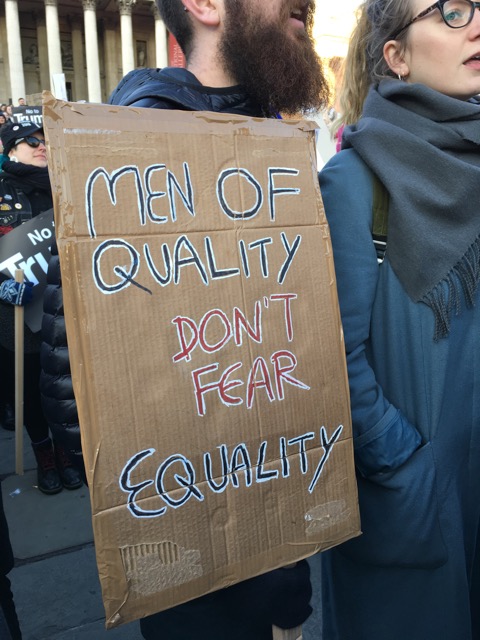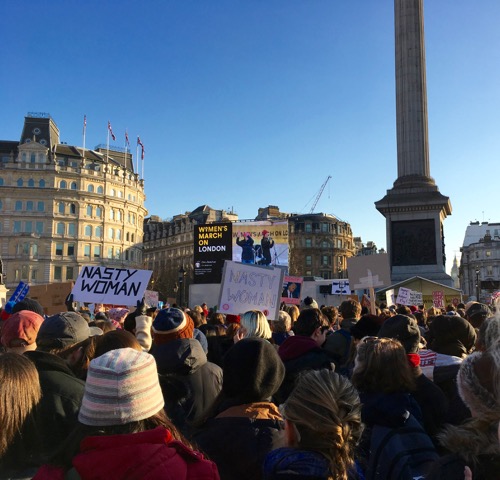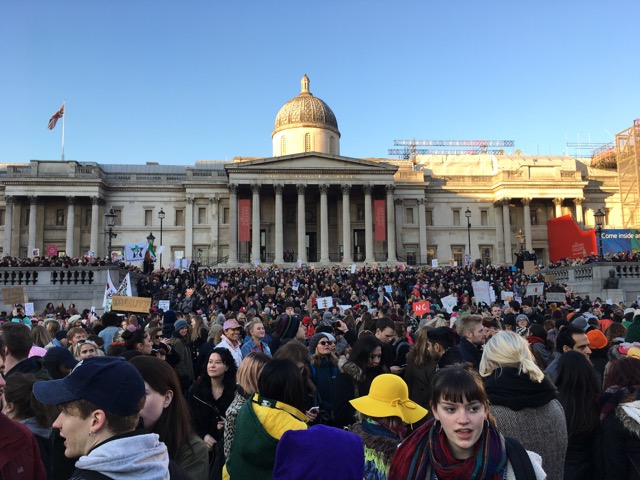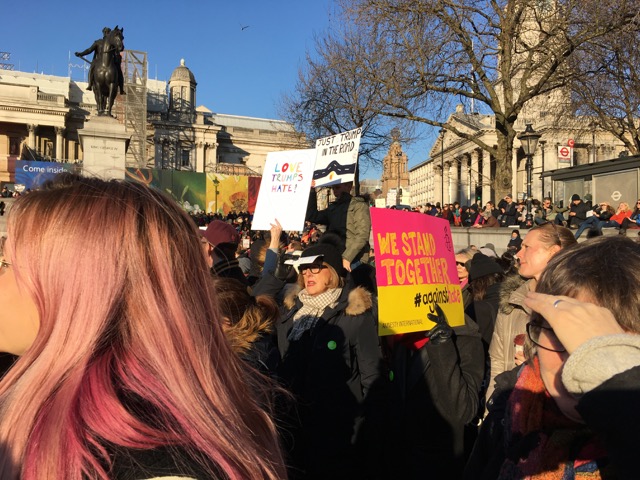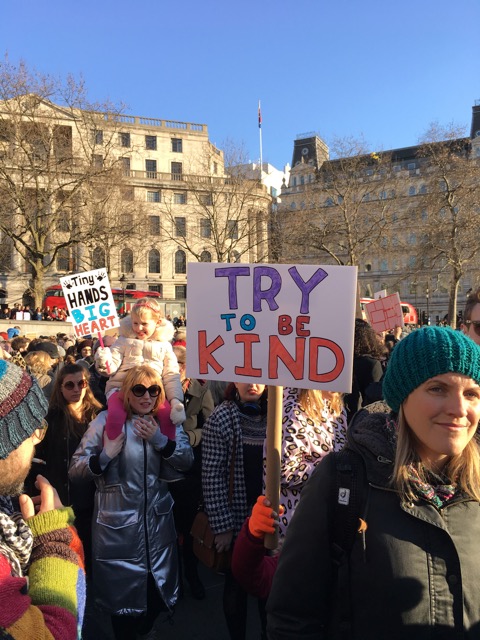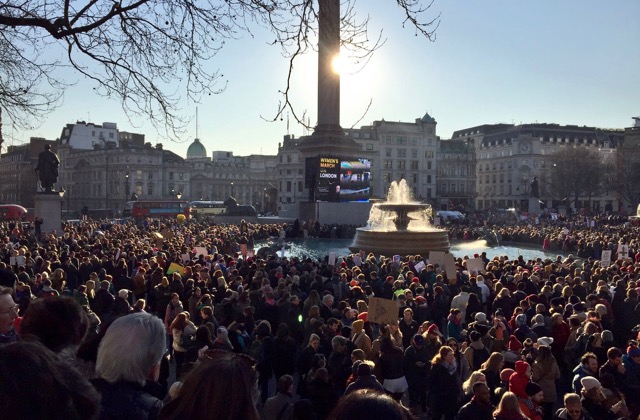Cerith Mathias was in London at the Women’s March, where she spoke to Alexandra Roach, Sian Harries, Rhiannon Lucy Cosslett, and Siân Norris about why they marched.
An estimated 100,000 people took to the streets of London on Saturday to join the Women’s March, one of hundreds taking place across the globe on the first day of Donald Trump’s presidency.
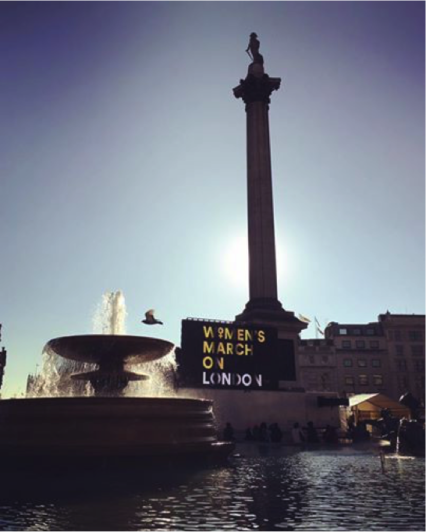 Inspired by the Women’s March in Washington DC, which was attended by over 500,000 protestors, international ‘sister marches’ took place in over 600 locations worldwide, to highlight women’s rights, which organisers believe to be under threat from Donald Trump’s administration.
Inspired by the Women’s March in Washington DC, which was attended by over 500,000 protestors, international ‘sister marches’ took place in over 600 locations worldwide, to highlight women’s rights, which organisers believe to be under threat from Donald Trump’s administration.
Beginning at the American Embassy in Grosvenor Square, the London march followed a 2 mile route along Pall Mall, ending in a rally in Trafalgar Square, which included a host of speakers from Sandi Toksvig to the Labour MP Yvette Cooper.
With numbers in attendance much higher than expected, access to Trafalgar Square was blocked by police soon after the rally began due to the volume of people in the area. Many marchers remained in the surrounding streets, with chants of ‘build bridges not walls’ reverberating around the square.
‘This is a march for equality and action for the future. We don’t want the clock being turned back on women’s equality’, Yvette Cooper told the crowd.
Calling the rally to a close, Toksvig asked the crowd to disperse ‘respectfully and with love for each other,’ before adding ‘you were part of a truly phenomenal day where London stopped to hear women’s voices.’
Why I marched: Alexandra Roach, actress
I marched for the first time in my life this weekend. I felt I had to do something, anything, along with many of my friends. The reason I took to the streets of London was simple.
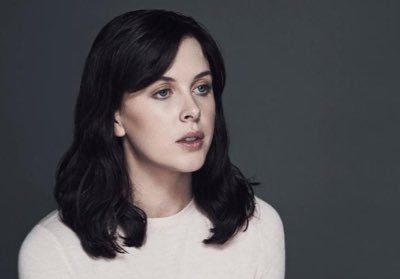 I marched against the message that Donald Trump sends out to the world.
I marched against the message that Donald Trump sends out to the world.
That it is OK to “grab women” and sexually assault them. A message that it is OK to bully disabled people, a message of building walls drenched in racism and fear.
His strong message to the world opposing gay rights. People are calling it the Women’s March, but essentially it’s on behalf of everyone whose rights are under threat.
To see 100,000 humans (and many dogs) march in solidarity was powerful and unifying after such a turbulent few months both here and in the US.
On the train back to Wales I felt hopeful and fearless but am under no doubt that this is when the real work starts.
Why I marched: Rhiannon Lucy Cosslett, journalist and author
 Taking part in the women’s march was a transformative experience. Like many women, I was feeling very downcast (not to mention furious) about Trump’s election, but solidarity and gathering with other women was just the antidote I needed. The atmosphere was electric, and the creativity on show in terms of hilarious and righteous chants and banners was really inspiring. It felt good to be showing our American sisters that we were on their side, and I know my American friends appreciated that. I couldn’t give a flying fuck whether or not Piers Morgan approves of it. Men like him are the problem, which is why it was so wonderful that so many feminist men – many of them dads with kids – marched alongside us on Saturday. Those who say the march wasn’t diverse were also talking rubbish. It was one of the most inclusive, diverse marches that I have ever been on. It was brilliant, and has given me hope in a new wave of feminist resistance. We’ve had enough.
Taking part in the women’s march was a transformative experience. Like many women, I was feeling very downcast (not to mention furious) about Trump’s election, but solidarity and gathering with other women was just the antidote I needed. The atmosphere was electric, and the creativity on show in terms of hilarious and righteous chants and banners was really inspiring. It felt good to be showing our American sisters that we were on their side, and I know my American friends appreciated that. I couldn’t give a flying fuck whether or not Piers Morgan approves of it. Men like him are the problem, which is why it was so wonderful that so many feminist men – many of them dads with kids – marched alongside us on Saturday. Those who say the march wasn’t diverse were also talking rubbish. It was one of the most inclusive, diverse marches that I have ever been on. It was brilliant, and has given me hope in a new wave of feminist resistance. We’ve had enough.
Why I marched: Sian Harries, comedy writer and performer
 Marching for equality alongside so many people from different backgrounds felt incredible. Brexit seems to have bolstered an intolerance towards minorities among some and I’d started to believe those who kept telling me I was “living in a bubble”. Having been labelled “the liberal elite”, accused of being “out of touch” and dismissed as an “expert” who lives in a metropolitan city, I’d also started to doubt whether I had the right to speak out.
Marching for equality alongside so many people from different backgrounds felt incredible. Brexit seems to have bolstered an intolerance towards minorities among some and I’d started to believe those who kept telling me I was “living in a bubble”. Having been labelled “the liberal elite”, accused of being “out of touch” and dismissed as an “expert” who lives in a metropolitan city, I’d also started to doubt whether I had the right to speak out.
However, the sheer number of people who turned out to march proved me wrong. As aerial footage showed mile upon mile of tiny little pink dots gathering across the globe, a larger, brighter picture emerged – I’m not alone. There are millions of us who still care, who want to look out for each other and who won’t accept a President of the United States who treats women like meat, mocks the disabled, discriminates against LGBTQ and associates with white supremacist groups.
Being part of such a large protest renewed my confidence that I am right to continue to speak out against discrimination because millions of people feel the same. We may lack equal representation as individual groups, but when we stand together and shout at the same time, the whole world can hear us.
Why I Marched: Siân Norris, author and founder of Bristol Women’s Literature Festival
 What marching achieved was a show of solidarity. A show of sisterhood. It achieved a demonstration that we, women across the world, were going to use our voices to challenge heteropatriarchy and white supremacy. It achieved a huge noise. And for every individual woman there, it achieved something else too: the knowledge and recognition that we have a voice and we are not afraid to use it.
What marching achieved was a show of solidarity. A show of sisterhood. It achieved a demonstration that we, women across the world, were going to use our voices to challenge heteropatriarchy and white supremacy. It achieved a huge noise. And for every individual woman there, it achieved something else too: the knowledge and recognition that we have a voice and we are not afraid to use it.
(All photos by the author)


